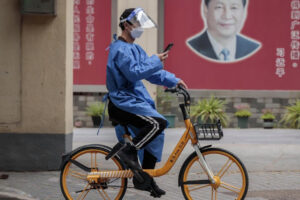
Chinese President Xi Jinping has reaffirmed the country’s zero-tolerance approach to Covid-19 even though “it might hurt the economy”. On a visit on Wednesday to Wuhan, the central Chinese city where the coronavirus was first detected, Xi said China could not afford to pursue herd immunity or “lie flat” – a reference to living with the virus.
“We would rather temporarily affect a little economic development, than risk harming people’s life safety and physical health, especially the elderly and children,” he said.
The commitment is expected to set the tone for the country’s direction on Covid-19 ahead of the Communist Party’s national congress in autumn when Xi is expected to secure a third term. China has sought to contain the coronavirus through swift lockdowns, mass testing and contact tracing in an approach known as “dynamic zero-Covid”.
Beijing’s tentative reopening disrupted by new Covid outbreak linked to nightclub in Chinese capital The resulting low number of deaths and limited spread of Covid-19 is widely seen as a political success for Xi and the party, which is partly why the top leadership has been reluctant to move away from it.
But there have been some signs of easing in restrictions, with the Ministry of Industry and Information Technology removing its “asterisk” system from travel records on mobile phones.
An asterisk indicated that a user had been in a Covid-19 outbreak in the previous 14 days, allowing authorities to test, deny entry to or quarantine people. Removing the system will allow most people, including from Shanghai, to travel more easily around the country.
By submitting, you consent to receiving marketing emails from SCMP. If you don't want these, tick here by registering, you agree to our T&C and Privacy Policy
The central government also said on Tuesday that it was relaxing quarantine requirements for international arrivals.
Instead of spending 14 days in quarantine and seven days in home isolation, people arriving from overseas will be required to spend seven days at a government-run quarantine facility, followed by another three days isolated at home. Human cost of China’s zero-Covid policy measured in stress and anxiety but China’s massive population still meant the country could not abandon zero-Covid, Xi said on Wednesday.
“China has a big population base. If we resort to ‘herd immunity’ or just ‘lie flat’, consequences would be unimaginable,” Xi said.
He said dynamic zero-Covid was the “most economic and effective” response and China could continue with it until “the final victory” against the pandemic was won.
China’s stringent Covid-19 curbs have long been criticised for disrupting mobility and production. The economy has been hit hard this year, especially in the second quarter when a slew of cities were locked down. Residents of Shanghai, the country’s largest port and financial hub, were ordered to stay home for two months as authorities tried to rein in an outbreak of the Omicron coronavirus variant.
Shanghai reopens after two-month Covid lockdown, but how fast can life return to normal?
The frustration is felt most keenly by private companies and the foreign business community, with lockdowns confining hundreds of millions of consumers to their homes and hitting supply chains.
But a low vaccination rate among the elderly and a lack of hospital capacity to treat the severely ill means the approach is unlikely to change dramatically soon, according to health officials.
Fuente: SouthChinaMorningPost